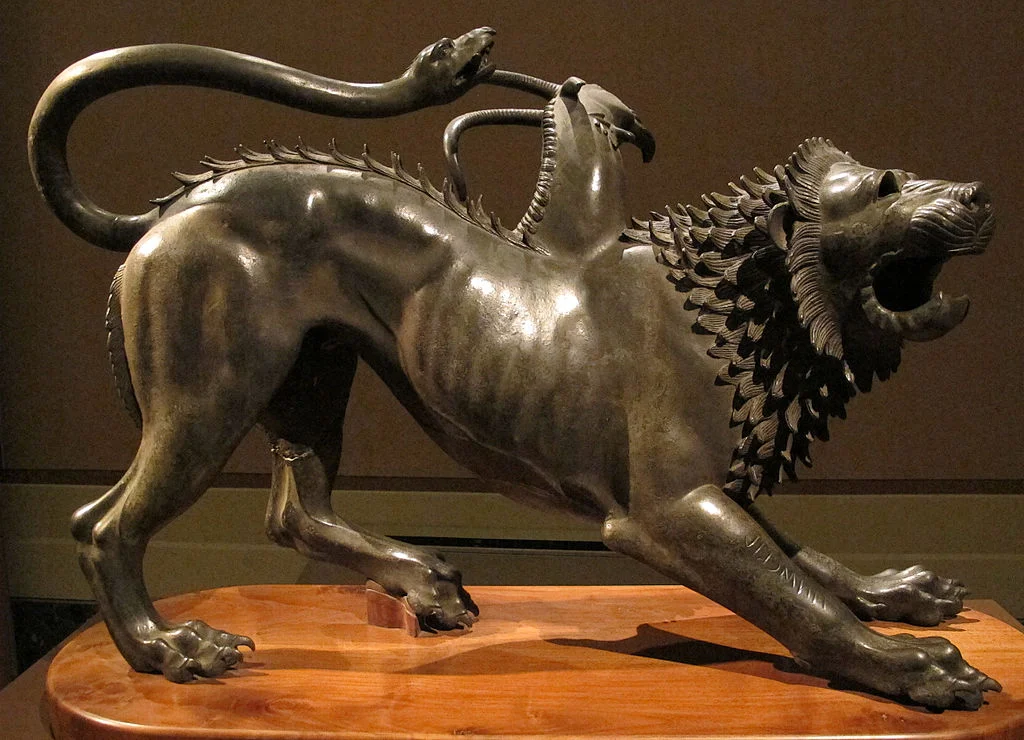Religion - The Church of the Chimera, Part 2
The Greek Pantheon, by Raphael. Pantheons are popular, particularly in fantasy writing.
I previously wrote about the Church of the Chimera, and looking back at that post it's lacking in a lot of ways. Now that I'm actually writing 'Claws of the Chimera', I need to establish the religion.
So far, I've established that:
- It's the dominant religion in the known world
- It involves worship of one being, the Chimera, through animal aspects
- Worship takes place in churches and cathedrals, lead by Fathers and Mothers
- It is a reincarnation-based religion, whose goal is to join with the Chimera's essence, and
- The Chimera is involved in the Hunt Eternal against Seofen, the seven-headed dragon.
There's elements of several religions in there, primarily Christianity, Buddhism and Norse. When it came to actually writing the book, though, these bare bones left me with a lot of space for improvement.
The Triumph of Civilisation by Jacques Réattu.
This article by Amy Rose Davis was my first stop. She neatly sums up what a religion should be into three points:
- Where did we come from? As a storyteller, this is absolute gold, basically an excuse to write stories. The LARP system I play in, Profound Decisions' Empire, really annoys a friend of mine because it has no creation myth. Also worth noting is that every major religion has apparently had a flood myth, lending credence to the fact that it might actually have happened. Stories are our business!
- What happens when we die? I've already answered that one, though I've since fleshed out the mechanics of it. People are born, live, and die; by their actions they are judged, and reincarnated as either a human or, if they have lived a good life, as an animal. If they are really good, they're born again as an animal destined to be uplifted - to be given intelligence on a level with a human. Uplifted animals join the Chimera when they die.
- How should we act while we're here? How do you get to that better place, and what happens if you're evil?
Hell, by Herrad of Landsberg.
That last one is the most important one on a day-to-day basis for any characters, as it tells them how to live their lives, and threatens them with something worse should they fall from the true way. It's also what any holy men would be exhorting others to do. Honestly, it's the bit I haven't quite worked out yet; watch this space!
Joe Wetzel's essay on Worldbuilding for Fantasy RPGs has several really amazing bits and pieces, and I encourage you to read the whole thing, but the section about how the religion is organised really caught my eye.
Specifically, he suggests gods can be arranged as:
- Families (think the Greek gods)
- Races (dwarves, elves, etc)
- Elementals (fire, water, earth, air),
- Celestials (constellations - see below)
- Heroes (mortals raised up)
- Natural things (animals)
- Stewards (created beings serving higher powers)
- Bureaucracy
- A mixture of any of these
What caught my eye was the constellations part, as we already have names for constellations such as the Eagle, the Ram, the Crab, the Dog, the Bear, and so on. It's perfect for 'Claws of the Chimera' for the Chimera to be in the stars in its many animal forms, watching.
The Chimera of Arezzo. Photo by Sailko. Although the Chimera in my novel is not a 'traditional' one, the original concept is really quite awesome!
The article also opens several cans of worms that are destined for another blog post in the near future: festival days, births, marriages, deaths... all things that need assigning in some way. One final article I used was an article by Susan Leigh Noble. I'm not going to reproduce them here, but she recommends twelve questions that will help mould your religion as you create it - a structure that's incredibly useful as story-writing prompts. You can find it here!




